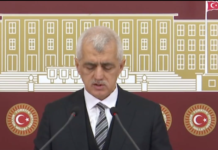Former public servants have revealed on Twitter the extent of Turkey’s post-coup purge by sharing “then-and-now photographs” of them in their new jobs as day laborers and blue-collar workers.
Former judge Mehmet Köroğlu posted a photograph of his watermelon stand with the caption, “Have you ever seen a judge selling watermelons?” His post was quickly joined by other former public servants who added their current work with the same caption, “Have you ever seen?”
Siz hiç karpuzcu hakim gördünüz mü🙂 pic.twitter.com/XulPjNNFq8
— Mehmet Köroğlu (@HkmMhmtKoroglu) May 7, 2021
Ahmet Arıcı posted a photograph of a construction site where he worked as a day laborer and said, “Have you ever seen a fighter pilot working in construction?” Yakup Sevinçhan shared a photograph of his lemon stand asking people if they had ever seen a state auditor selling lemons.
Siz hiç inşaat işçisi “Savaş Pilotu” gördünüz mü? https://t.co/Qk3MjKe5jm pic.twitter.com/6yB7Z1yvUB
— Ahmet Arıcı (@Arici_99) May 8, 2021
Ben limoncu Sayistay Denetcisi gordum😉😂 https://t.co/YdZQsCyHym pic.twitter.com/CAqJb0e0hE
— yakup sevinchan (@ykpsevinchan) May 7, 2021
The posts aimed to draw attention to the aftermath of the purge that has left thousands of families facing economic difficulties and social marginalization.
Many purge victims have had to work in uninsured jobs with very little workplace safety. There have also been cases where former public servants have died due to occupational accidents in physically demanding jobs.
Following a coup attempt on July 15, 2016, the Turkish government declared a state of emergency and carried out a massive purge of state institutions, summarily dismissing more than 150,000 public servants including academics, teachers, military personnel, diplomats and police officers with emergency decree-laws subject to neither judicial nor parliamentary scrutiny.
A total of 4,156 judges and prosecutors as well as 20,571 members of the armed forces, were removed from their jobs for alleged membership in or relationships with “terrorist organizations” by emergency decree-laws.
Former public servants were not only fired from their jobs; they were also banned from working again in the public sector and getting a passport. The government also made it difficult for them to work formally in the private sector. Notes were put on the social security database about dismissed public servants to deter potential employers.
The Justice for Victims Platform and former Peoples’ Democratic Party (HDP) deputy Ömer Faruk Gergerlioğlu released a joint report in July 2020 which said that the two-year-long state of emergency declared after the coup in Turkey caused immense suffering among public servants who were dismissed from their jobs by the government as well as their families.
“The decree-law victims not only were removed from their jobs but also barred from seeking employment in the private sector and denied access to social security benefits,” said Gergerlioğlu.
The dismissed public servants lost 70 percent of their average monthly income, a circumstance that reduced them to dire financial straits, according to a survey conducted for the joint report.
The survey indicates that 99.1 percent of the victims are college or university graduates or holders of master’s or doctoral degrees, which means an immense loss of human resources for Turkey’s public administration.
According to the victims’ family members taking part in the survey, the biggest problem they have been facing is economic hardship (97.9 percent) followed by psychological problems (88.6 percent), loss of social prestige and social exclusion (83.7 percent), disintegration of social circles (83.1 percent), unemployment/lack of employment (80.4 percent) and lack of social security (73.2 percent), respectively.
















[…] olarak, pek çok tasfiye kurbanı sigortasız işlerde çalışmak zorunda kaldım çok az iş güvenliği ile. Ayrıca var birkaç vaka eski kamu görevlilerinin fiziksel güç […]
[…] : nombre d’entre eux survivent avec des emplois précaires non déclarés. Plusieurs cas de décès suite à des accidents du travail ont été […]